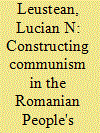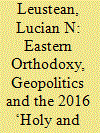| Srl | Item |
| 1 |
ID:
077249


|
|
|
|
|
| Publication |
2007.
|
| Summary/Abstract |
This article analyses the ambiguous and contradictory relationship between the Orthodox Church and the communist regime during the first two years of the Romanian People's Republic. The installation of communism and the process of Stalinisation led to an unprecedented control of the church. The church was actively employed in propaganda and the regime imposed its own people in the hierarchy. On the one hand, Romanian communists followed the Soviet model regarding the place of the church in the communist state while, on the other hand, the church hierarchy adapted to the new political system by creating a theory of 'social apostolate'. Lacking popular support, the communists used the church as an instrument through which they could acquire the political support of the masses. The church thus enjoyed a favoured position in society mainly because the communists employed it in their ideological expansionism and confrontation with the West
|
|
|
|
|
|
|
|
|
|
|
|
|
|
|
|
| 2 |
ID:
158367


|
|
|
|
|
| Summary/Abstract |
In March 2014, at the time of Russia’s takeover of Crimea, the heads of 14 Orthodox churches convened under the leadership of Ecumenical Patriarch Bartholomew, the Istanbul-based primus inter pares in Eastern Orthodoxy, and announced that a ‘Holy and Great Synod of the Orthodox Church’ would be held in 2016. The Synod, which took place in June 2016 in Crete, was a unique ecclesiastical gathering, bringing together competing geopolitical visions of religion, state and power. This article examines the political mobilisation of Orthodox churches by contextualising the holding of the Synod in relation to Russia’s advancement of spiritual security after the end of the Cold War. It provides a textual analysis of Synodical documents and highlights the patterns of religious and political structures in the contemporary Eastern Orthodox world.
|
|
|
|
|
|
|
|
|
|
|
|
|
|
|
|